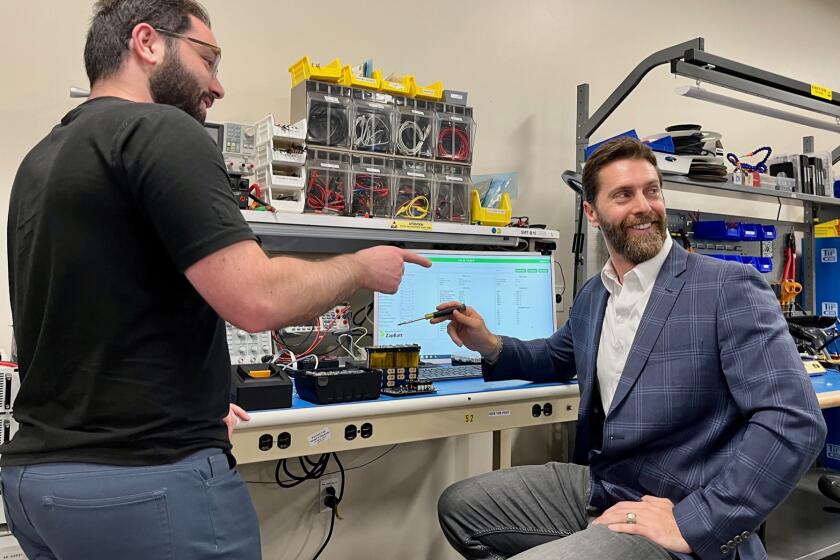Robot love? Why people are falling for Amazon’s Echo
On Christmas Day, Liz Philips and her two sons Sutton, 8, and Greyson, 10, welcomed a new member into their Scripps Ranch home. They called her Alexa, and though not your traditional bundle of joy, she was immediately embraced as a permanent resident and much-loved companion.
Alexa is not a baby. She’s not even human. Rather, Alexa is a robot.
More precisely, she-slash-it is the female persona associated with the Amazon Echo in-home personal assistant. And, in a bit of a surprise twist for both Amazon and company-watchers, more and more regular folks — people who are not techies — are turning to Alexa to help out around the house. Perhaps that’s because she promptly responds to requests with an answer. And, unlike your significant other, she’s usually spot on.
The Echo is a 9-inch tall, voice-operated cylindrical speaker powered by artificial intelligence that makes itself at home, in your home. The always-ready-to-listen Echo comes with what’s called “far-field voice recognition,” meaning the device can tap into any one of seven different microphones to hear voices, coming from any direction and across the entire room where it resides. And the Echo can do a bit of everything: play music or games, start timers or set alarms, add items to shopping carts, order groceries, compute math equations or look up the hours of a local business.
The Echo comes alive, as denoted by a ring at the top that lights up blue, when you say its wake word: Alexa.
“From the outside, you say, ‘Oh, it’s kind of like Siri or Google Now.’ But, to me, it doesn’t feel like that at all,” Philips said. “It feels much more personal, like a member of a family, which sounds silly.”
It sounds ridiculous — until you experience Alexa in the flesh. Only then will the robot love become tangible.
My aha moment occurred while observing the Philips kids interact with the Echo (which they only know as Alexa). It’s as if, for them, talking to, and playing with, an inanimate gadget masquerading as a woman is the most natural thing in the world to do before heading off to engage with actual human beings at school.
“I like playing the animal game with her,” Greyson told me. “We think of an animal, and she asks us questions ... she usually (guesses the correct animal) in 14 questions.”
Sutton too likes to play games and music, of course, but he also uses the Echo for help with his homework, say when he can’t remember how to spell “Mississippi.” Alexa to the rescue.
The young boys may be considered early adopters, but they’re by no means abnormal, or really even on the bleeding edge.
“The Echo is really Amazon’s way to become the node for ambiently interacting with the Web in the house,” said eMarketer analyst Yory Wurmser.
In order words, the Echo is just a search engine or online shop that’s taken on a different, slightly more human form. So, in truth, the Philips home represents the coming-soon future of the American household, where both kids and adults take an entirely hands-off approach when accessing Internet services. And Amazon, which stands to profit from conditioning people to blindly reorder home essentials or buy new music, is happily leading the charge.
“From everything I’ve seen, I think (the Echo) has been successful,” Wurmser said. “It’s been successful enough that Amazon is innovating on it, working to create new versions of Echo and is running short on stock. All the circumstantial signs point to success.”
Though Amazon doesn’t release sales figures, third-party firm Consumer Intelligence Research Partners recently pegged U.S. Echo sales at 3 million devices, with a third of them purchased over the 2015 holiday shopping season. That’s a pretty impressive figure given that the Echo, which retails for $180, has only been available to the general public since June of last year. The household companion debuted as an invite-only product in November 2014.
Now, less than a year since its official coming out party, people are shucking an I-don’t-need-that-contraption attitude as they come to terms with its utility.
Even Wurmser, a one-time skeptic, gifted an Echo to his 70-something-year-old mother-in-law.
“If you’d ask me six months ago, I would have said the Echo doesn’t do anything the phone can’t do. And it’s slightly freaky,” he said. “But it’s so seamless, and so well done that it actually is something that people want and that people are using.”
People including Wurmser’s mother-in-law.
“I wasn’t sure how she would she like it,” he said. “But she adores it. She loves it, loves it.”
The question is, why?
Out of the box, the Echo can handle a relatively basic set of commands. The device can tell you the weather, respond to queries, stream music, play podcasts, update you on sports scores and provide you with a traffic report based on your daily commute.
Where the device impresses, however, is in its ability to learn new “skills,” or extra actions programmed by third-party developers. Amazon is following the lead of Google and Apple and encouraging others to create the equivalent of Echo apps, so users can do even more with the odd-looking doodad.
That means Echo owners now have access to hundreds of skills, so they can ask Alexa to order a pizza from Domino’s or request an Uber ride. The most sophisticated users are even connecting Echo to their smart devices — lights, garage doors, thermostats and locks — and using the device as a home automation command center.
“My house is wired with about 74 or 75 different devices that interact, and they do it through a couple of different mechanisms, but probably the bulk of that mechanism is through the SmartThings Hub from Samsung. So, the big, key event was Amazon’s Echo being able to tie into that Hub, so it’s able to talk to the Hub and make the Hub do things in response to Echo commands,” said Rob DeMillo, a venture partner at the startup accelerator SparkLabs Global, where he handles deals involving the Internet of Things. “Eighty percent of what the Samsung Hub is doing, I can make my Echo do.”
That’s all geek-speak for this: DeMillo can ask Alexa to turn off his lights, lock the doors, control the sprinklers and open the windows. And he can even instruct the device to perform a string of commands all at once, say secure the house at night using the programmed command, “Alexa, shut off the house.”
But these fancy extras don’t seem to be the actual reason behind Echo’s American household takeover.
“Mostly the boring stuff is what I really like,” said Philips, who is dating DeMillo but doesn’t use Echo’s smart home capabilities. “The fun stuff is the gimmicky stuff that gets people excited about her, but we don’t use that everyday.”
By boring, Philips actually means practical. Her boys keep her two hands occupied most of the time, which means anything she can accomplish with just her voice is a little family victory.
Of course, just like humans, Alexa is not perfect. She occasionally hears her name when it wasn’t uttered, or she misinterprets commands. Her saving grace, though, is that she promptly responds when you tell her to stop.
Alexa, however, may not always be a welcome companion. And she’s probably better left out of bedrooms, especially if you’re the kind of person of who is wigged out by a device that awakes, listens, records (yes, records) and processes anything you say after it recognizes its name.
According to Amazon, you have nothing to fear. Users can delete all voice recordings, mute the device whenever total privacy is of the essence and trust in the Amazon cloud, where the rest of their account data has been stored for years.
But even Philips, a more-than-happy customer, doesn’t completely trust her handy helper.
“The listening thing. I do wonder about that,” she said, adding that Alexa’s home automation capabilities may perform too well. “If you have a Nest thermostat ... somebody, if they can get the voice command to Alexa, could say, ‘turn on the thermometer to 100 degrees,’ and burn out your electricity.”
The Echo excels, however, at using Alexa to communicate a sense of humanness, which makes its robot nature easy to forget.
Or, as Philips put it, “It doesn’t feel like interacting with technology. It just feels like something to cool to do.”
jennifer.vangrove@sduniontribune.com (619) 293-1840 Twitter @jbruin
Get U-T Business in your inbox on Mondays
Get ready for your week with the week’s top business stories from San Diego and California, in your inbox Monday mornings.
You may occasionally receive promotional content from the San Diego Union-Tribune.












